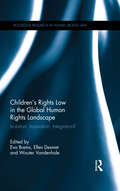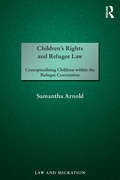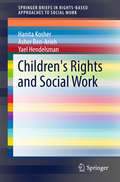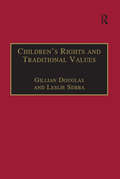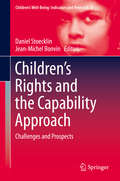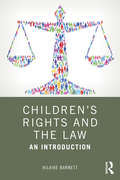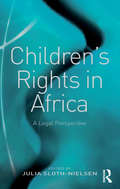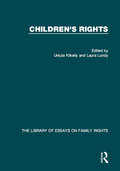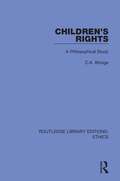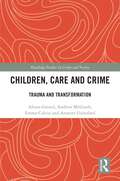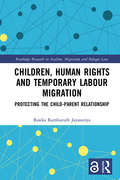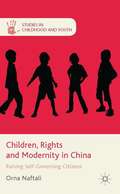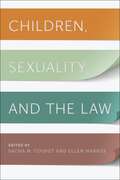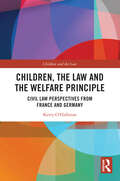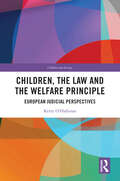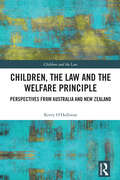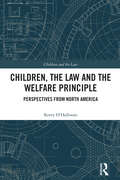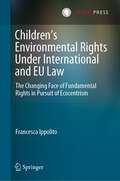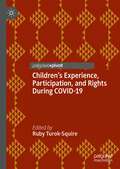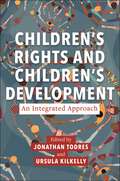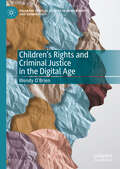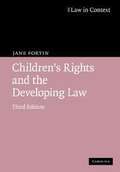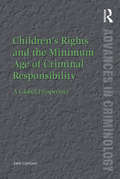- Table View
- List View
Children's Rights Law in the Global Human Rights Landscape: Isolation, inspiration, integration? (Routledge Research in Human Rights Law)
by Wouter Vandenhole Eva Brems Ellen DesmetChildren’s rights law is often studied and perceived in isolation from the broader field of human rights law. This volume explores the inter-relationship between children’s rights law and more general human rights law in order to see whether elements from each could successfully inform the other. Children’s rights law has a number of distinctive characteristics, such as the emphasis on the ‘best interests of the child’, the use of general principles, and the inclusion of ‘third parties’ (e.g. parents and other care-takers) in treaty provisions. The first part of this book questions whether these features could be a source of inspiration for general human rights law. In part two, the reverse question is asked: could children’s rights law draw inspiration from developments in other branches of human rights law that focus on other specific categories of rights holders, such as women, persons with disabilities, indigenous peoples, or older persons? Finally, the interaction between children’s rights law and human rights law – and the potential for their isolation, inspiration or integration – may be coloured or determined by the thematic issue under consideration. Therefore the third part of the book studies the interplay between children’s rights law and human rights law in the context of specific topics: intra-family relations, LGBTQI marginalization, migration, media, the environment and transnational human rights obligations.
Children's Rights and Refugee Law: Conceptualising Children within the Refugee Convention (Law and Migration)
by Samantha ArnoldChildren make up half of the world’s refugees and over 40 per cent of the world’s asylum seekers. However, children are largely invisible in historical and contemporary refugee law. Furthermore, there has been very limited interaction between the burgeoning children’s rights framework, in particular the Convention on the Rights of the Child (CRC), and the 1951 Convention relating to the Status of Refugees (Refugee Convention). This book explores the possibility of a children’s rights approach to the interpretation of the Refugee Convention and within that what such an approach might look like. In order to construct a children’s rights approach, the conceptualisations of children outside the legal discipline, within international children’s rights law and then within refugee law and refugee discourse are analysed. The approach taken is socio-legal and comparative in nature and the suitability of the Refugee Convention as a framework for the interpretation of child claims is examined. The book analyses to what extent the Refugee Convention is capable of dealing with claims from children based on the modern conceptualisation of children, which is underscored by two competing ideologies: the child as a vulnerable object in law to be protected and the child as subject with rights and the capacity to exercise their agency. The influence each regime has had on the other is also analysed. The work discusses how a children’s rights approach might improve outcomes for child applicants. The book makes an original contribution to child refugee discourse and as such will be an invaluable resource for academics, researchers and policymakers working in the areas of migration and asylum law, children’s rights and international human rights law.
Children's Rights and Social Work (SpringerBriefs in Rights-Based Approaches to Social Work)
by Asher Ben-Arieh Hanita Kosher Yael HendelsmanThis book provides a conceptual framework for children's rights as well as specific strategies and opportunities for social workers to apply in their work. It guides social work professionals and students through the history of children's rights. It also includes a call for a paradigm shift from a focus on the right to nurturance to the right to self-determination, as well as a contrasting look at children's rights in the West versus the rest of the world.
Children's Rights and Traditional Values (Programme on International Rights of the Child #2)
by Gillian Douglas Leslie SebbaThis book of essays by legal scholars from the United Kingdom, Eire, Israel and Palestine explores the extent to which the recognition of the concept of children’s rights is affected by adherence to religious, cultural and ethnic traditions. The aim is twofold: first, to illuminate the interface between internationally-agreed norms of conduct regarding children and national and cultural determination to preserve traditional approaches; and secondly, to reflect upon the conflicts within societies between different cultural and religious groups in their attempts to determine whether 'liberal/secular' or 'conservative/religious' norms predominate in attitudes to children’s upbringing. This is the first collection of papers covering and comparing the UK and Israeli/Palestinian jurisdictions. The particular blends of social, religious and cultural diversity in both regions, mingled with the political factors operating as well, render these jurisdictions of special interest as case-studies in the reception of 'western/liberal' norms and values. Moreover, Israel and Palestine, despite their manifestly different cultures as compared with Britain, have been influenced by the colonial legacy of the common law, rendering this particular east-west comparison of special interest.
Children's Rights and the Capability Approach: Challenges and Prospects (Children’s Well-Being: Indicators and Research #8)
by Daniel Stoecklin Jean-Michel BonvinThis volume addresses the conditions allowing the transformation of specific children's rights into capabilities in settings as different as children's parliaments, organized leisure activities, contexts of vulnerability, children in care. It addresses theoretical questions linked to children's agency and reflexivity, education, the life cycle perspective, child participation, evolving capabilities and citizenship. The volume highlights important issues that have to be taken into account for the implementation of human rights and the development of peoples' capabilities. The focus on children's capabilities along a rights-based approach is an inspiring perspective that researchers and practitioners in the field of human rights would like to deepen.
Children's Rights and the Law: An Introduction
by Hilaire BarnettThis book identifies the definition of a child within the law, the rights of children, and discusses the extent to which primarily English law gives adequate recognition to and protection of these rights. To what extent does English law gives adequate recognition to and protection of the rights of children? Historically the idea of and protection of rights has focused on parental rights rather than the rights of the child. The rights of children have remained far less recognised and certain until recently. Using case studies from the United Kingdom and beyond, this book takes a thematic approach to children’s rights and considers topics including: underlying concepts such as the welfare of the child and safeguarding, the right to education and to medical treatment, the right to freedom from abuse and/or sexual and commercial exploitation, including contemporary challenges from forced marriage, FGM, modern slavery and trafficking, the role of the State in relation to children in need of care and protection, children's rights in the criminal justice system, the right to contract and employment. In addition, the book provides an introduction to key aspects of domestic and international law, including the Children Act 1989, the UN Convention on the Rights of the Child, the European Convention on Human Rights and the Human Rights Act 1998. The book will be of great interest to law and social science students in the areas of Child Development and Protection, Human Rights Law, Family Law, Child Law, and Child Studies, as well as to social workers, police officers, magistrates, probation officers and other related professions.
Children's Rights in Africa: A Legal Perspective
by Julia Sloth-NielsenThis collection is anchored in an African conception of children's rights and the law, and reflects contemporary discourses taking place in the region of the children's rights sphere. The majority of contributors are African and adopt an individual approach to their topic which reflects their first-hand experience. The book focuses on child rights issues which have particular resonance on the continent and the chapters span themes which are both broad and narrow, containing subject matter which is both theoretical and illuminated by practice. The book profiles recent developments and experiences in furthering children's legal rights in the African context, and distils from these future trends the specific role that the law can play in the African children's rights environment.
Children's Rights in the United States: In Search of a National Policy
by Lawrence S. Wrightsman Nancy E. Walker Catherine M. BrooksThe authors of this volume provide discussion on vital issues related to the rights of children in the United States, including: the historical and contextual perspective on the rights of children; the United Nations Convention on the Rights of the Child; the differing views on children's rights and competencies; and the rights of children within the family, the social service system, the health care system, the educational system, the juvenile justice system and in employment.
Children's Rights: A Comparative Perspective (Children's Human Rights Ser. #48)
by Ursula KilkellyThe articles in this volume shed light on some of the major tensions in the field of children‘s rights (such as the ways in which children‘s best interests and respect for their autonomy can be reconciled), challenges (such as how the CRC can be made a reality in the lives of children in the face of ignorance, apathy or outright opposition) and critiques (whether children‘s rights are a Western imposition or a successful global consensus). Along the way, the writing covers a myriad of issues, encompassing the opposition to the CRC in the US; gay parenting: Dr Seuss‘s take on children‘s autonomy; the voice of neonates on their health care; the role of NGO in supporting child labourers in India, and young people in detention and more.
Children's Rights: A Philosophical Study
by C. A. WringeOriginally published in 1981, this book provides a detailed account of the emergence of the children’s rights movement, and analyses the concept of a right. It considers the justifications which may be sought when rights are claimed. Particular attention is given to the problem which arises when different rights are seen to be in conflict with each other or with other kinds of moral consideration. These arguments are then examined with regard to such special features of children as their incomplete but developing rationality and their material dependence on adults.
Children, Care and Crime: Trauma and Transformation (Routledge Studies in Crime and Society)
by Alison Gerard Emma Colvin Andrew McGrath Annette GainsfordThe historical context of colonisation situates the analysis in Children, Care and Crime of the involvement of children with care experience in the criminal justice system in an Australian jurisdiction (New South Wales), focusing on residential care, policing, the provision of legal services and interactions in the Children’s Court. While the majority of children in care do not have contact with the criminal justice system, this book explores why those with care experience, and Indigenous children, are over-represented in this system. Drawing on findings from an innovative, mixed-method study – court observations, file reviews and qualitative interviews – the book investigates historical and contemporary processes of colonisation and criminalisation. The book outlines the impact of trauma and responses to trauma, including inter-generational trauma caused by policies of colonisation and criminalisation. It then follows a child’s journey through the continuum of care to the criminal justice system, examining data at each stage including the residential care environment, interactions with police, the provision of legal services and experiences at the Children’s Court. Drawing together an analysis of the gendered and racialised treatment of women and girls with care experience in the criminal justice system, the book particularly focuses on legacies of forced removal and apprenticeship which targeted Aboriginal and Torres Strait Islander women and girls. Through analysing what practices from England and Wales might offer the NSW context, our findings are enriched by further reflection on how decriminalisation pathways might be imagined. While there have been many policy initiatives developed to address criminalisation, in all parts of the study little evidence was found of implementation and impact. To conclude, the book examines the way that ‘hope tropes’ are regularly deployed in child protection and criminal justice to dangle the prospect of reform, and even to produce pockets of success, only to be whittled away by well-worn pathways to routine criminalisation. The conclusion also considers what a transformative agenda would look like and how monitoring and accountability mechanisms are key to new ways of operating. Finally, the book explores strengths-based approaches and how they might take shape in the child protection and criminal justice systems. Children, Care and Crime is aimed at researchers, lawyers and criminal justice practitioners, police, Judges and Magistrates, policy-makers and those working in child protection, the criminal justice system or delivering services to children or adults with care experience. The research is multidisciplinary and therefore will be of broad appeal to the criminology, law, psychology, sociology and social work disciplines. The book is most suitable for undergraduate courses focusing on youth justice and policing, and postgraduates researching in this field.
Children, Human Rights and Temporary Labour Migration: Protecting the Child-Parent Relationship (Routledge Research in Asylum, Migration and Refugee Law)
by Rasika Ramburuth JayasuriyaThis book focuses on the neglected yet critical issue of how the global migration of millions of parents as low-waged migrant workers impacts the rights of their children under international human rights law. The work provides a systematic analysis and critique of how the restrictive features of policies governing temporary labour migration interfere with provisions of the Convention on the Rights of the Child that protect the child-parent relationship and parental role in children’s lives. Combining social and legal research, it identifies both potential harms to children’s well-being caused by prolonged child-parent separation and State duties to protect this relationship, which is deliberately disrupted by temporary labour migration policies. The book boldly argues that States benefitting from the labour of migrant workers share responsibility under international human rights law to mitigate harms to the children of these workers, including by supporting effective measures to maintain transnational child-parent relationships. It identifies measures to incorporate children’s best interests into temporary labour migration policies, offering ways to reduce interferences with children’s family rights. This book fills a gap that emerges at the intersection of child rights studies, migration research and existing literature on the purported nexus between labour migration and international development. It will be a valuable resource for academics, researchers and policymakers working in these areas.
Children, Rights and Modernity in China
by Orna NaftaliThis book is an original, ethnographic study of the emergence of a new type of thinking about children and their rights in urban China. It brings together evidence from a variety of Chinese government, academic, pedagogic and media publications, and from interviews and participant observations conducted in schools and homes in Shanghai, China.
Children, Sexuality, and the Law (Families, Law, and Society #1)
by Ellen Marrus Sacha M. CoupetAmerican political and legal culture is uncomfortable with children's sexuality. While aware that sexual expression is a necessary part of human development, law rarely contemplates the complex ways in which it interacts with children and sexuality. Just as the law circumscribes children to a narrow range of roles--either as entirely sexless beings or victims or objects of harmful adult sexual conduct--so too does society tend to discount the notion of children as agents in the domain of sex and sexuality. Where a small body of rights related to sex has been carved out, the central question has been the degree to which children resemble adults, not necessarily whether minors themselves possess distinct and recognized rights related to sex, sexual expression, and sexuality. Children, Sexuality, and the Law reflects on some of the unique challenges that accompany children in the broader context of sex, exploring from diverse perspectives the ways in which children emerge in sexually related dimensions of law and contemporary life. It explores a broad range of issues, from the psychology of children as sexual beings to the legal treatment of adolescent consent. This work also explores whether and when children have a right to expression as understood within the First Amendment. The first volume of its kind, Children, Sexuality, and the Law goes beyond the traditional discourse of children as victims of adult sexual deviance by highlighting children as agents and rights holders in the realm of sex, sexuality, and sexual orientation.
Children, the Law and the Welfare Principle: Civil Law Perspectives from France and Germany (Children and the Law)
by Kerry O'HalloranThis book contrasts and compares the different application of the law relating to the welfare interests and rights of children in France and Germany. It does so by applying the same matrix of indicators to explore jurisdictional differences between welfare interests and rights in the contexts of public family law (civil – care and protection etc and criminal – youth justice etc); private family law (matrimonial, adoption etc); and hybrid public/private family law (wardship, adoption from state care etc). By profiling the nations in accordance with the same indicators it reveals important jurisdictional differences in the extent to which welfare interests or rights determine how the law is currently applied to children in France and Germany. This volume will be of interest to academics and researchers engaged in law, legal studies and social policy, and also to policymakers, administrators, and professionals working within child welfare systems.
Children, the Law and the Welfare Principle: European Judicial Perspectives (Children and the Law)
by Kerry O'HalloranThis book continues the themes addressed by its five predecessors in this series by examining the role of the principle of the welfare interests of the child as addressed in international legislation and by international courts.It provides a record of the key cases in the development of the principle as articulated primarily by the European Court of Human Rights (ECtHR) and complemented by rulings of the Court of Justice of the European Union (CJEU), and the United Nations Committee on the Rights of the Child (UN CRC). It identifies and assesses themes arising from the many decades of ECtHR cases dealing with issues affecting the welfare interests and rights of children as referred to the Court from the 46 Member States that comprise the Council of Europe. By differentiating between the functions of the welfare principle and those of children’s rights – in the public (care, protection, and control), in the private (matrimonial, adoption, etc.), and in the hybrid (adoption from state care, etc.) sectors of family law – it reveals how the law relating to children is changing across Europe. By examining the international framework of legislation and related caselaw it identifies and assesses the themes in that law as they have unfolded over time.In addition to a digest of international cases and legislation – that identifies and tracks the role of the welfare principle and the emerging rights of children – lawyers, academics, and other researchers will find a wealth of information on how the law has evolved to reflect corresponding changes in social mores. For those interested in politics and social policy, there is much illuminating evidence on how the law has balanced this principle relative to others – such as proportionality and subsidiarity – within both civil and criminal contexts.
Children, the Law and the Welfare Principle: Perspectives from Australia & New Zealand (Children and the Law)
by Kerry O'HalloranThis book contrasts and compares the different application of the law relating to the welfare interests of children in Australia and New Zealand including, respectively, the Indigenous and Māori children of those countries. It does so by applying the same matrix of indicators to explore jurisdictional differences between welfare interests and rights in the contexts of public family law (civil – care and protection etc and criminal – youth justice etc); private family law (matrimonial, adoption etc); and hybrid public/private family law (wardship, adoption from state care etc). By profiling the nations in accordance with the same indicators it reveals important jurisdictional differences in the extent to which welfare interests or rights determine how the law is currently applied to children in Australia and New Zealand.
Children, the Law and the Welfare Principle: Perspectives from North America (Children and the Law)
by Kerry O'HalloranThis book continues the themes addressed by its two predecessors in this mini-series by examining the role of the principle of the welfare interests of the child in the law of the U.S. and Canada. It provides a record of the key milestones in its development in each country and conducts a comparative analysis of the contemporary law relating to children in both. In doing so, it focuses also on the Indigenous communities – the AN/AI and the First Nations – of the U.S. and Canada respectively. By identifying and analysing the functions of the principle in the public (care, protection and control, etc), private (matrimonial, adoption, etc) and hybrid (adoption from care, surrogacy, etc) sectors of family law, it builds a picture of the law relating to children in the two countries and reveals significant jurisdictional differences. By examining the legislation and related caselaw, it assesses the different effects of the same legal framework on the welfare of Indigenous and other children. In addition to a digest of cases and legislation that identifies and tracks the role of this legal principle, lawyers, academics and other researchers will find a wealth of information on how it has evolved to reflect corresponding changes in social mores. For those interested in politics and social policy, there is much illuminating evidence of how the law has balanced this principle relative to others in both civil and criminal contexts.
Children’s Environmental Rights Under International and EU Law: The Changing Face of Fundamental Rights in Pursuit of Ecocentrism
by Francesca IppolitoThis book is dedicated to a topic which has for a long time lacked the attention it deserves within the academic world. It intends to address in a coherent and comprehensive manner the problem of the environmental rights of the child, which are not identical to the ones of adults whose environmental rights have been appraised from a general point of view. In the absence of any international law instrument explicitly granting a child the right to a clean environment, drawing on an extensive and original analysis of the UN Convention on the Rights of the Child and the practice of its monitoring body, this book undertakes an assessment of the extent to which these challenges may be overcome through a greater engagement between international law on the rights of the child and international environmental law. The result is the first comprehensive study on the manner in which these two mutually reinforcing legal regimes can interact to strengthen the protection of children’s environmental human rights at stake in the increased strategic environmental and climate litigations at both the national and international level. The book is recommended reading for, amongst others, policy makers, international environmental lawyers and human rights lawyers and practitioners. Additionally, lecturers, students and researchers from a range of disciplines will also gain from seeing how new legal scholarship and intertwined branches of international law contribute to the continual development of the living rights of the human rights conventions. Francesca Ippolito is Associate Professor of International Law in the Department of Political and Social Science of the University of Cagliari, Italy. She holds the Jean Monnet Chair on European Climate of Change - REACT for 2021-2024.
Children’s Experience, Participation, and Rights During COVID-19
by Ruby Turok-SquireThis edited volume examines how opportunities to realise children’s rights and the experience of childhood itself have been changed by the pandemic. It brings together the voices of leading scholars, policy advisors, psychologists, charities engaged in empowering children, and children and young people themselves. By exposing children’s own perspectives and ideas for change, the book aims to suggest ways in which children could be better supported during this crisis. Chapters connect the experiences of under-represented groups, including children with disabilities and housing-distressed children. Authors illuminate ways to see and hear children more clearly and enable children’s participation during and beyond COVID-19.This book is part of a mini-series that explores the effects of COVID-19 on children’s education, rights and participation. These books will expose and connect the struggles faced by particularly vulnerable children, including children with disabilities, housing-distressed children, and refugee and displaced children. They will explore how best to listen to and support children in diverse situations, in order to enable them to realise their rights more effectively.
Children’s Rights and Children’s Development: An Integrated Approach (Families, Law, and Society)
by Ursula Kilkelly Jonathan TodresOffers an assessment of how children’s rights take shape and are realized at various stages of child development and, in turn, can and should inform law and policyChildren’s rights and child development frameworks are critical to understanding children’s lived experiences, advancing child wellbeing, and implementing children’s rights. However, research in the two fields has proceeded largely on separate tracks. Children’s Rights and Child Development seeks to forge opportunities to deepen understanding about children’s rights in light of the scientific research on child development to inform fresh perspectives on research, law, and policy affecting children.Drawing on existing literature, studies, and research, Children’s Rights and Child Development provides an in-depth examination of the fundamental stages in childhood development—early childhood, middle childhood, and adolescence. The book goes beyond the often very general language in law and policies that considers children as a homogenous group. It delineates how the rights of young people can be understood at each stage of development and how this can, and should, inform law and policy on children’s rights.Integrating children’s perspectives with the expertise from leading scholars in children’s rights and child development, Todres and Kilkelly reveal how an integrated approach to child rights and child development can be most impactful to child advocacy. This book is essential reading for anyone interested in child advocacy, offering insight into how the rights of young people can be understood at different stages of development, in a developmentally appropriate and rights compliant manner.
Children’s Rights and Criminal Justice in the Digital Age (Palgrave Critical Studies in Human Rights and Criminology)
by Wendy O'BrienIn the data economy, childhood is a lucrative commodity. The digital technologies that offer incredible possibilities for children’s enrichment and empowerment also open avenues for their exploitation, denigration, criminalisation, and control. Coming to grips with this paradigm of technological benefits and harms requires a deepened understanding about how children's rights are engaged within a technocratic system that distributes costs and benefits unequally. In the context of the altered flows of data and power in the digital age, Wendy O’Brien argues for a resurgence in the commitment to equal human dignity. Challenging narrow conceptualisations of online risks to children, the book identifies the need to confront the techno-social status quo that accepts harms against children as inevitable. This book will be of interest to legal scholars, criminologists, policy makers and technologists with an interest in upholding children’s rights in the age of AI.
Children’s Rights and International Development
by Myriam Denov Richard Maclure Kathryn CampbellA timely examination of the plight of children and youths in developing nations. The chapters strike a balance between diagnostic analysis of the conditions of risk, with prescriptive ideas for approaching and intervening with marginalized children.
Children’s Rights and the Developing Law
by Jane FortinFollowing the implementation of the Human Rights Act 1998, awareness has increased that we live in a rights-based culture and that children constitute an important group of rights holders. Now in its 3rd edition, Children's Rights and the Developing Law explores the way developing law and policies in England and Wales are simultaneously promoting and undermining the rights of children. It reflects on how far these developments take account of children's interests, using current research on children's needs as a template against which to assess their effectiveness and considering a broad range of topics, including medical law, education and youth justice. A critical approach is maintained throughout, particularly when assessing the extent to which the concept of children's rights is being acknowledged by the courts and policy makers and the degree to which the UK fulfils its obligations under, for example, the UN Convention on the Rights of the Child.
Children’s Rights and the Minimum Age of Criminal Responsibility: A Global Perspective (New Advances in Crime and Social Harm)
by Don CiprianiChildren of almost any age can break the law, but at what age should children first face the possibility of criminal responsibility for their alleged crimes? This work is the first global analysis of national minimum ages of criminal responsibility (MACRs), the international legal obligations that surround them, and the principal considerations for establishing and implementing respective age limits. Taking an international children's rights approach, with a rich theoretical framework and the vitality of the UN Convention on the Rights of the Child, this work maintains a critical perspective, such as in challenging the assumptions of many children's rights scholars and advocates. Compiling the age limits and statutory sources for all countries, this book explains the broad historical origins behind most of them, identifying the recurring practical challenges that affect every country and providing the first comprehensive evidence that a general principle of international law requires all nations, regardless of their treaty ratifications, to establish respective minimum age limits.
